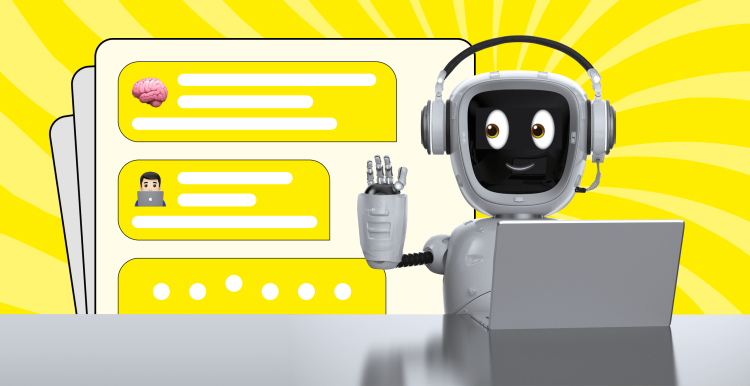Artificial Intelligence (AI) has brought about transformative changes in numerous industries, but perhaps no sector has seen its potential more vividly realized than customer service. AI-powered tools are not just automating repetitive tasks; they are reshaping the entire landscape of customer interaction. From chatbots to voice assistants and predictive analytics, AI is enhancing both the speed and quality of customer service. As we dive into how AI is revolutionizing customer service, we’ll examine case studies from leading brands that have successfully integrated AI solutions into their support processes.
1. AI Chatbots: A Game-Changer for Customer Interaction
AI chatbots have emerged as a game-changer in the realm of customer service. These virtual assistants use natural language processing (NLP) to understand and respond to customer queries in real-time. AI chatbots are designed to offer instant responses, reducing wait times and enabling businesses to provide 24/7 support without the need for human agents. They can handle routine inquiries, troubleshoot problems, and even guide customers through complex processes. Let’s take a look at some leading brands utilizing AI chatbots to transform their customer service experience.
Sephora: Personalizing Customer Experience Through AI Chatbots
Sephora, the global cosmetics retailer, has leveraged AI in its customer service operations to enhance customer engagement. The brand implemented Sephora Virtual Artist, an AI-powered chatbot, which offers personalized beauty advice and product recommendations based on the customer’s preferences. Using machine learning algorithms and computer vision, the chatbot can help customers try on makeup virtually by analyzing their facial features in real-time via their smartphone cameras.
Moreover, Sephora has integrated AI chatbots into its mobile app, allowing customers to interact with virtual assistants that can answer questions about product ingredients, availability, and even assist with product returns. The chatbot also provides personalized recommendations based on customer purchase history and preferences, enhancing the overall shopping experience.
By using AI-powered chatbots, Sephora not only improves response times but also provides personalized, tailored experiences that keep customers engaged and satisfied. This approach reduces the burden on human customer service agents and allows them to focus on more complex or sensitive issues.
Lufthansa: Streamlining Customer Support with AI-Powered Chatbots
Lufthansa, one of the largest airlines in the world, has also embraced AI chatbots to streamline its customer support services. The company’s chatbot, Mildred, helps passengers with a variety of services, from booking tickets to checking flight status and managing reservations. By leveraging natural language processing, Mildred can respond to customer inquiries in multiple languages, allowing Lufthansa to cater to a global customer base.
Mildred’s AI system is designed to handle common passenger questions, such as inquiries about baggage policies, check-in procedures, and airport locations. By automating these routine tasks, Lufthansa is able to reduce the workload on human agents and focus their resources on more complex customer needs. The use of AI chatbots has not only improved operational efficiency but also enhanced the overall customer experience by providing quicker and more accurate responses.
2. AI-Powered Voice Assistants: Enhancing Real-Time Conversations
Voice assistants have become increasingly popular in customer service, offering a more conversational way for customers to interact with businesses. Powered by AI, these virtual assistants can handle a variety of customer service tasks, such as booking appointments, making reservations, and answering common questions. AI voice assistants use speech recognition, natural language processing, and machine learning to engage customers in meaningful, real-time conversations.
Domino’s Pizza: AI Voice Assistant for Seamless Ordering
Domino’s Pizza, a global leader in food delivery, has implemented an AI-powered voice assistant called Dom to enhance its ordering process. Dom allows customers to place orders via voice commands, making the process faster and more intuitive. Using natural language processing, Dom can understand customer preferences, make personalized recommendations, and even process repeat orders with a simple voice prompt.
What sets Dom apart is its ability to handle complex interactions. For example, it can recognize when a customer wants to modify an order and automatically adjust the details, such as adding extra toppings or changing delivery instructions. Dom integrates seamlessly with Domino’s mobile app and website, allowing customers to order pizza via voice commands while driving or performing other tasks.
Dom’s AI-driven capabilities have helped Domino’s achieve higher customer satisfaction rates by providing a more convenient and efficient ordering experience. The success of the AI voice assistant is a testament to how companies can use AI to improve customer service and drive customer loyalty.
Capital One: Transforming Banking with AI-Powered Voice Assistants
Capital One, a major American bank, has taken customer service to the next level by integrating AI voice assistants into its services. Their AI-powered virtual assistant, Eno, helps customers with a variety of banking needs, from checking balances and making transactions to answering account-related questions.
Eno can engage in natural, human-like conversations with customers, responding to queries about credit card charges, account balances, and recent transactions. One of Eno’s most innovative features is its ability to provide real-time fraud detection alerts. If a suspicious transaction occurs, Eno immediately notifies the customer, helping to prevent fraud and ensuring peace of mind.
The AI-powered voice assistant has greatly improved Capital One’s customer service by offering a seamless, efficient, and secure way for customers to manage their finances. Eno exemplifies how AI can enhance the customer experience by providing timely, relevant, and personalized support in real-time.

3. AI-Driven Predictive Analytics: Anticipating Customer Needs
One of the most significant advancements in AI is predictive analytics, which enables businesses to anticipate customer needs before they arise. By analyzing vast amounts of customer data, AI can predict customer behavior and offer tailored solutions, ensuring that customer support is proactive rather than reactive.
Netflix: Using AI for Personalized Recommendations and Customer Support
Netflix, the global streaming giant, has become synonymous with personalized recommendations. The company uses AI algorithms to analyze users’ viewing habits, preferences, and feedback to suggest content that aligns with their interests. However, AI is also at the core of Netflix’s customer service model, helping predict potential issues and proactively addressing them.
For instance, if Netflix identifies that a user is experiencing difficulty in streaming content due to poor internet connectivity, the platform may automatically lower the video quality to ensure a seamless viewing experience. Additionally, predictive analytics allows Netflix’s customer support team to be more efficient in addressing account-related issues, such as billing inquiries or subscription changes, by anticipating problems before customers contact support.
Netflix’s use of AI-driven predictive analytics not only enhances the customer experience but also empowers the company to be more proactive in its approach to customer service. By anticipating issues and providing solutions in advance, Netflix is able to reduce the need for reactive support interventions, ultimately leading to a more satisfying experience for users.
Macy’s: Personalizing Shopping Experiences with AI
Retailers like Macy’s have begun using AI-powered predictive analytics to personalize customer interactions both in-store and online. By analyzing customer purchase history, browsing patterns, and social media activity, Macy’s can predict which products a customer might be interested in purchasing and tailor recommendations accordingly.
The AI system also helps Macy’s anticipate customer inquiries and provide faster, more accurate responses. For example, if a customer is looking for a specific size or color of a product, AI systems can help staff quickly locate the item, improving the efficiency of the shopping experience. Macy’s use of predictive analytics ensures that customers are provided with relevant and timely support, ultimately boosting customer satisfaction and loyalty.
4. AI for Sentiment Analysis: Understanding Customer Emotions
Another critical way AI is revolutionizing customer service is through sentiment analysis, which involves analyzing customer feedback and social media interactions to gauge sentiment and identify issues in real time. By understanding the emotions behind customer interactions, businesses can adjust their customer service strategies accordingly.
Coca-Cola: Monitoring Social Media with AI for Real-Time Sentiment Analysis
Coca-Cola has been using AI-driven sentiment analysis to monitor customer feedback on social media platforms. By analyzing comments, reviews, and posts, Coca-Cola can quickly detect emerging issues, identify customer concerns, and respond to negative sentiment in real-time. This allows the company to address customer complaints proactively and prevent potential PR crises.
Sentiment analysis also helps Coca-Cola understand customer preferences and trends, allowing the company to adjust its marketing strategies and customer service offerings to align with customer sentiment. By using AI to track and respond to sentiment, Coca-Cola has improved its customer service by ensuring that it is always in tune with customer feelings.
5. The Future of AI in Customer Service
The future of AI in customer service is bright, with continuous advancements in machine learning, natural language processing, and robotics. AI technologies are becoming more intelligent, intuitive, and capable of handling increasingly complex customer service tasks. In the future, businesses will likely see even more integration of AI across various touchpoints, including voice assistants, chatbots, and predictive analytics, offering customers a more personalized and efficient service experience.
Conclusion
AI is revolutionizing customer service by enabling brands to deliver faster, more personalized, and more efficient support. From chatbots and voice assistants to predictive analytics and sentiment analysis, companies are using AI to enhance every aspect of the customer journey. As demonstrated by the case studies from leading brands like Sephora, Lufthansa, Domino’s, Capital One, Netflix, and Coca-Cola, AI is not just a tool for automating tasks—it’s a transformative force that is reshaping how businesses interact with their customers. With AI continuing to evolve, the potential for further improvements in customer service is limitless.











































